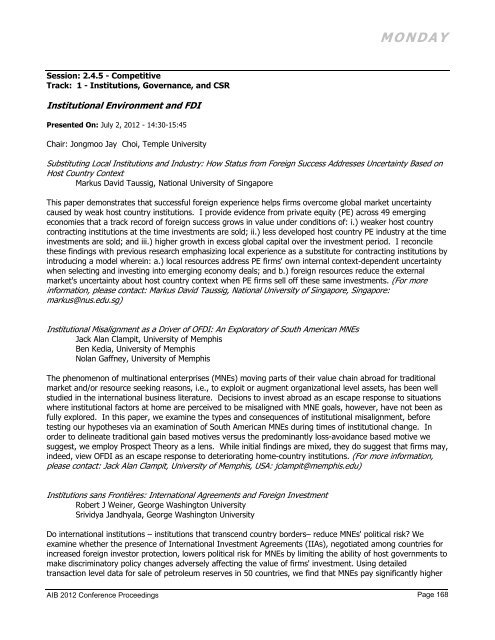AIB 2012 Conference Proceedings - Academy of International ...
AIB 2012 Conference Proceedings - Academy of International ...
AIB 2012 Conference Proceedings - Academy of International ...
Create successful ePaper yourself
Turn your PDF publications into a flip-book with our unique Google optimized e-Paper software.
MONDAY<br />
Session: 2.4.5 - Competitive<br />
Track: 1 - Institutions, Governance, and CSR<br />
Institutional Environment and FDI<br />
Presented On: July 2, <strong>2012</strong> - 14:30-15:45<br />
Chair: Jongmoo Jay Choi, Temple University<br />
Substituting Local Institutions and Industry: How Status from Foreign Success Addresses Uncertainty Based on<br />
Host Country Context<br />
Markus David Taussig, National University <strong>of</strong> Singapore<br />
This paper demonstrates that successful foreign experience helps firms overcome global market uncertainty<br />
caused by weak host country institutions. I provide evidence from private equity (PE) across 49 emerging<br />
economies that a track record <strong>of</strong> foreign success grows in value under conditions <strong>of</strong>: i.) weaker host country<br />
contracting institutions at the time investments are sold; ii.) less developed host country PE industry at the time<br />
investments are sold; and iii.) higher growth in excess global capital over the investment period. I reconcile<br />
these findings with previous research emphasizing local experience as a substitute for contracting institutions by<br />
introducing a model wherein: a.) local resources address PE firms' own internal context-dependent uncertainty<br />
when selecting and investing into emerging economy deals; and b.) foreign resources reduce the external<br />
market's uncertainty about host country context when PE firms sell <strong>of</strong>f these same investments. (For more<br />
information, please contact: Markus David Taussig, National University <strong>of</strong> Singapore, Singapore:<br />
markus@nus.edu.sg)<br />
Institutional Misalignment as a Driver <strong>of</strong> OFDI: An Exploratory <strong>of</strong> South American MNEs<br />
Jack Alan Clampit, University <strong>of</strong> Memphis<br />
Ben Kedia, University <strong>of</strong> Memphis<br />
Nolan Gaffney, University <strong>of</strong> Memphis<br />
The phenomenon <strong>of</strong> multinational enterprises (MNEs) moving parts <strong>of</strong> their value chain abroad for traditional<br />
market and/or resource seeking reasons, i.e., to exploit or augment organizational level assets, has been well<br />
studied in the international business literature. Decisions to invest abroad as an escape response to situations<br />
where institutional factors at home are perceived to be misaligned with MNE goals, however, have not been as<br />
fully explored. In this paper, we examine the types and consequences <strong>of</strong> institutional misalignment, before<br />
testing our hypotheses via an examination <strong>of</strong> South American MNEs during times <strong>of</strong> institutional change. In<br />
order to delineate traditional gain based motives versus the predominantly loss-avoidance based motive we<br />
suggest, we employ Prospect Theory as a lens. While initial findings are mixed, they do suggest that firms may,<br />
indeed, view OFDI as an escape response to deteriorating home-country institutions. (For more information,<br />
please contact: Jack Alan Clampit, University <strong>of</strong> Memphis, USA: jclampit@memphis.edu)<br />
Institutions sans Frontières: <strong>International</strong> Agreements and Foreign Investment<br />
Robert J Weiner, George Washington University<br />
Srividya Jandhyala, George Washington University<br />
Do international institutions – institutions that transcend country borders– reduce MNEs' political risk We<br />
examine whether the presence <strong>of</strong> <strong>International</strong> Investment Agreements (IIAs), negotiated among countries for<br />
increased foreign investor protection, lowers political risk for MNEs by limiting the ability <strong>of</strong> host governments to<br />
make discriminatory policy changes adversely affecting the value <strong>of</strong> firms' investment. Using detailed<br />
transaction level data for sale <strong>of</strong> petroleum reserves in 50 countries, we find that MNEs pay significantly higher<br />
<strong>AIB</strong> <strong>2012</strong> <strong>Conference</strong> <strong>Proceedings</strong><br />
Page 168

















